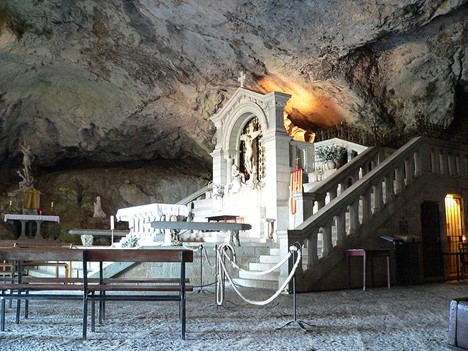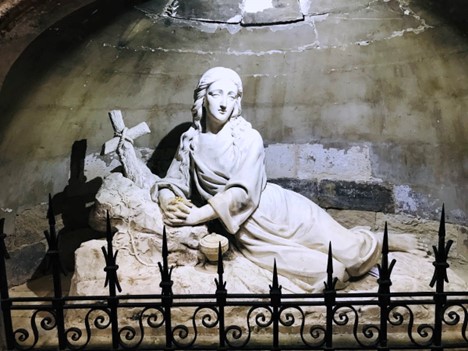dominican saints
Saint Mary Magdalen, Protectress of the Order

“After Magdalene was converted to penitence the Lord bestowed such great grace upon her that after the Blessed Virgin no woman could be found to whom greater reverence should be shown in this world and greater glory in heaven.”
Bl. Humbert of Romans
biography
Mary Magdalen is a model of contemplation, and is thus a suitable proctectress for an Order whose end is the salvation of souls by the preaching of the truths contemplated
Mary Magdalen, a sister of Lazarus and of Martha, of Bethany, was a notorious sinner in Jerusalem. Moved by the preaching of Jesus, she did public penance. She went openly into the house of the Pharisee with whom Jesus was sitting at table, threw herself at His feet, anointed them with precious ointment, washed them with her tears, and wiped them with her hair. Jesus, knowing her contrite heart, forgave her her sins (Luke 7:37, 38), and from that time forward she became the most zealous and faithful of the women who were disciples of Our Lord. She followed Him, always ministered unto Him of her substance (Luke 8:3), and when He died was standing under the cross.
Epistle: Canticle 3:2-5; 8:6,7
I will rise and will go about the city; in the streets and the broad ways I will seek him whom my soul loveth; I sought him and I found him not. The watchmen who keep the city found me: Have you seen him whom my soul loveth? When I had a little passed by them, I found him whom my soul loveth. I held him; and I will not let him go till I bring him into my mother’s house, and into the chamber of her that bore me. I adjure you, O daughters of Jerusalem, by the roes and the harts of the fields, that you stir not up, nor awake my beloved till she please. Put me as a seal upon thy heart, as a seal upon thy arm, for love is strong as death; jealousy as hard as hell; the lamps thereof are fire and flame. Many waters cannot quench charity, neither can the floods drown it; if a man should give all the substance of his house for love, he shall despise it as nothing.
The soul that, following the direction of the watchmen, that is, the priests, teachers, and rulers of the Church, seeks Jesus, He goes to meet, gives Himself up to, takes up His abode in, with all His love, with all His treasures. The soul which has found Christ for delight forgets all outward things, and no longer has love or joy but for and in Christ. How should it be otherwise? What can be wanting to him who truly possesses Christ? This love for Him Who loved us unto death shows itself by outward acts that are heroic. So Mary Magdalen loved Jesus. Follow her example.
Gospel: Luke 7:36-50
At that time: One of the Pharisees desired Jesus to eat with him. And He went into the house of the Pharisee, and sat down to meat. And behold a woman that was in the city, a sinner, when she knew that He sat at meat in the Pharisee’s house, brought an alabaster box of ointment, and standing behind, at His feet, she began to wash His feet with tears, and wiped them with the hairs of her head, and kissed His feet, and anointed them with the ointment. And the Pharisee, who had invited Him, seeing it, spoke within himself, saying: This man, if He were a prophet, would know surely who and what manner of woman this is that toucheth Him, that she is a sinner. And Jesus answering, said to him: Simon, I have somewhat to say to thee. But he said: Master, say it. A certain creditor had two debtors, the one owed five hundred pence, and the other fifty. And whereas they had not wherewith to pay, he forgave them both. Which, therefore, of the two loveth him most? Simon answering, said: I suppose that he to whom he forgave most. And He said to him: Thou hast judged rightly. And turning to the woman, He said unto Simon: Dost thou see this woman? I entered into thy house, thou gavest Me no water for My feet; but she with tears hath washed My feet, and with her hairs hath wiped them. Thou gavest Me no kiss; but she, since she came in, hath not ceased to kiss My feet. My head with oil thou didst not anoint; but she with ointment hath anointed My feet. Wherefore I say to thee: Many sins are forgiven her, because she hath loved much. But to whom less is forgiven, he loveth less. And He said to her: Thy sins are forgiven thee. And they that sat at meat with Him began to say within themselves: Who is this that forgiveth sins also? And He said to the woman: Thy faith hath made thee safe, go in peace.
Magdalen, who had sinned openly, openly did penance. In like manner, he who has given public scandal must seek to make amends for it by public good example.
Magdalen confessed her sins, says Saint Ambrose, not with words, but with abundant tears of penitence. To tell her sins to Christ, the All-knowing, was not necessary; but what a confession was there in the posture of humiliation, and in the tears that flowed from the contrite sinner. Would you obtain forgiveness? Confess with contrition, like Magdalen.
The words, “Thy faith hath made thee safe,” denote a faith active as love. Faith and love are in truth never separated, for he only truly believes who also loves; and he only loves according to God’s will who believes in Him. Therefore believe in truth, love, and show your love by earnest hatred of every sin, by flying from occasions of sin, by fighting against your passions, by change of your life, and by humble confession, and as true as God lives you will be saved, as was Magdalen; the peace of God will enter into your heart.

sT. mARY mAGADELENE:
pROTECTRESS OF THE dOMINICAN oRDER
“Short Lives of the Dominican Saints” by a Sister of the Congregation of St. Catherine of Siena (Stone, Staffordshire), 1901.
The holy penitent, St. Mary Magdalene, whose praise is in the Gospel, has ever been regarded as the particular protectress of the children of St. Dominic and especially of his Third Order. Our Lord Himself assigned her as mistress and patroness to St. Catherine of Siena. It is said to have been she who, together with St. Catherine of Alexandria, accompanied our Blessed Lady when she brought the miraculous picture of our Holy Father St. Dominic to Soriano. Innumerable passages in the lives of our saints testify to the love and devotion they bore her.
Tradition tells us that, in the persecution which arose in Jerusalem after the death of St. Stephen, St. Mary Magdalene, together with her brother, St. Lazarus, her sister, St. Martha, St. Maximin, who was one of the seventy-two disciples, and others, were placed by the Jews on a vessel without oars or sails and entirely destitute of provisions, and thus seemed doomed to certain destruction. But God’s angels were watching over the little craft and guided it safely to the shores of Provence. The holy company landed at Marseilles, of which city St. Lazarus became the first Bishop. St. Martha founded a community of holy women at Tarrascon; and St. Mary Magdalene and St. Maximin proceeded to Aix, where the latter fixed his episcopal See.
Together they evangelized Provence, preparing themselves for each instruction by prayer and fasting, and confirming their testimony by miracles. But the holy penitent sighed after a life of solitude, that she might sit continually in spirit at those Divine feet which she had washed with her tears and anointed with the spikenard of great price. Our Lord was well content to grant her that “better part,” which He had promised should “not be taken from her.” He sent His angels to conduct her to a wild and solitary cave on a mountain-side not far from the shores of the Mediterranean, and now known by the name of “La Sainte- Baume.” Here the Saint spent well-nigh three and thirty years in the exercise of penance and contemplation, her life being miraculously sustained without the aid of ordinary food. St. Vincent Ferrer records the tradition that every day, at each of the seven hours of prayer, the angels raised her in the air to listen to heavenly music and to participate in the Divine Banquet.
At length our Lord appeared to her and sweetly invited her, in return for the hospitality she had shown Him in His mortal life, to enter the heavenly mansions. She was miraculously conveyed to the oratory of St. Maximin, where the holy Bishop once more refreshed her spirit with the Bread of Angels; and immediately after receiving It, she gave up her soul to the Master whom she had loved so devotedly. Her holy remains were laid to rest in an alabaster tomb, in memory of that alabaster vase which twice served to guard the perfume with which she anointed the Lord. This tomb was in the crypt in which St. Maximin himself was afterwards buried, and the place bears his name to this day.
When, at the beginning of the eighth century, the Saracens began their ravages in Provence, which continued some three hundred years, the Cassianite monks, who had charge of the sacred relics, carefully concealed the crypt beneath a mound of earth, and it was not discovered until 1279. According to the Dominican tradition, in that year the Prince of Salerno, who was a nephew of St. Louis of France, and afterwards became Charles II, King of Sicily and Count of Provence, was taken prisoner by the King of Aragon, and closely confined in the fortress of Barcelona. By the advice of his confessor, who was a Friar Preacher, he commended himself eagerly to St. Mary Magdalen, the patron saint of Provence. That night, which was the eve of her feast, the Prince was suddenly awakened from sleep and found the Saint standing beside him. She bade him rise and follow her, together with his suite. She led them safely out of the fortress, and, after they had walked for a little time in silence, she turned and asked them if they knew where they were. They replied that they believed themselves to be close to the walls of Barcelona. “Not so,” answered the Saint; “you are already six miles beyond the Spanish frontier, and only one league from Narbonne.” Charles threw himself at her feet, saying, “What can I do in gratitude for this night’s deliverance?” Then she bade him search for her relics, telling him that he would find them in the Church of St. Maximin. “You will know my body,” she said, “by this token; the forehead is still preserved with the flesh and skin entire on that part which touched our Lord’s risen body. You will also find two vessels, one full of the hair with which I wiped His sacred feet, and another with the blood-stained earth that I gathered at the foot of the cross. I desire that these precious relics be now given to the care of my Brethren, the Friars Preachers, who are indeed my Brethren, because, like them, I was a preacher and an apostle.” With words she disappeared; and when day dawned, the Prince found that he was indeed close to Narbonne.
He lost no time in repairing to St. Maximin, where he discovered the sacred relics in a box, bearing an inscription to the effect that they had been removed thither in the year 710, for fear of the sacrileges of the Saracens. Charles then founded a convent of the Order on the spot and entrusted the precious treasures to the keeping of the Friars. Not content with this testimony of his gratitude to his heavenly deliverer, the Prince, when he succeeded to his hereditary dominions, founded no less than twelve convents of the Order, and in all of them it was ordained that a daily commemoration should be made of St. Mary Magdalene in the Little Office of the Blessed Virgin.
The Friars Preachers continued to be the faithful guardians of the relics at St. Maximin and of the sanctuary erected at La Sainte-Baume down to the time of the French Revolution. After the restoration of the French Province of the Order by the celebrated Father Lacorrdaire, the care of these holy places was once more entrusted to the sons of S. Dominic, A. D. 1859. Even in our own day they are much frequented places of pilgrimage.
Prayer:
Grant to us, O most clement Father, that, as the Blessed Mary Magdalen, loving our Lord Jesus Christ above all things, obtained the pardon of her sins, so she may obtain for us from Your mercy eternal happiness. Through the same Jesus Christ our Lord. Amen.
from a Sermon by Pope saint Gregory the great
When Mary Magdalen came to the tomb and did not find the Lord’s body, she thought it had been taken away and so informed the disciples. After they came and saw the tomb, they too believed what Mary had told them. The text then says: “The disciples went back home,” and it adds: “but Mary wept and remained standing outside the tomb.”
We should reflect on Mary’s attitude and the great love she felt for Christ; for though the disciples had left the tomb, she remained. She was still seeking the one she had not found, and while she sought she wept; burning with the fire of love, she longed for him who she thought had been taken away. And so it happened that the woman who stayed behind to seek Christ was the only one to see him. For perseverance is essential to any good deed, as the voice of truth tell us: “Whoever perseveres to the end will be saved.”
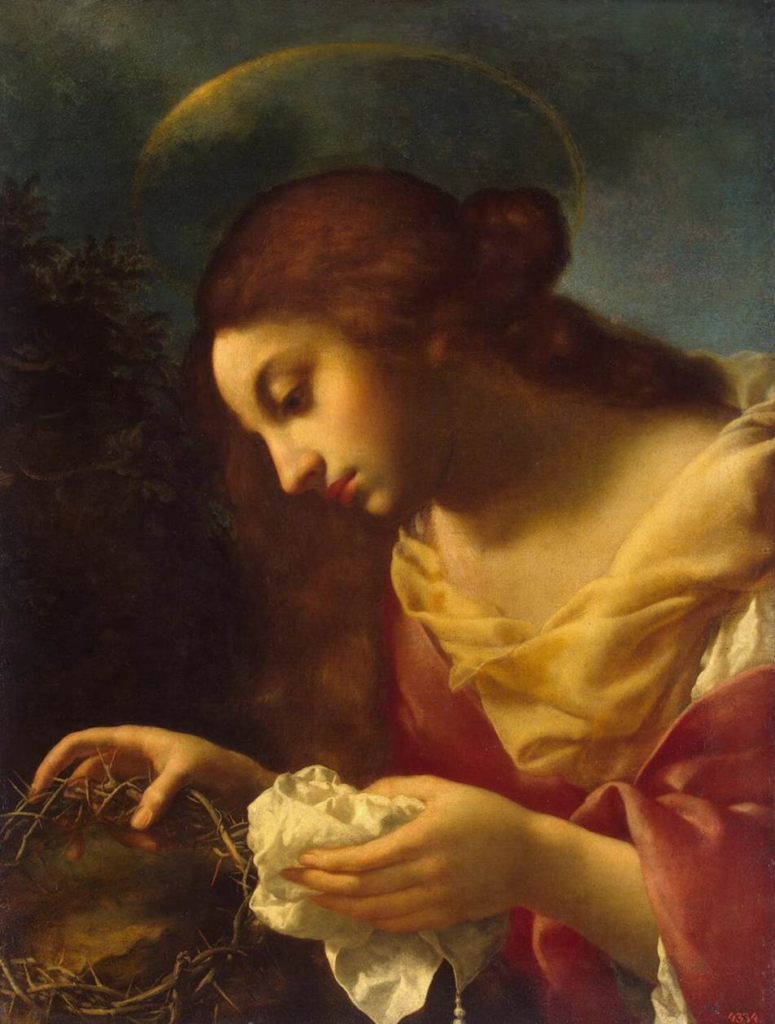
Three Privileges of Mary Magdalene
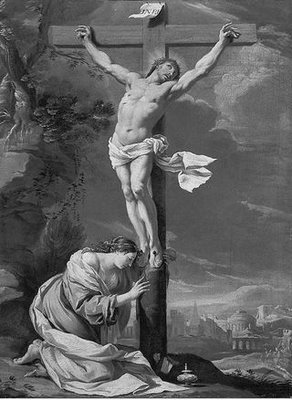
St. Thomas Aquinas – (Commentary on the Gospel of John 20)
“Note the three privileges given to Mary Magdalene. First, she had the privilege of being a prophet because she was worthy enough to see the angels, for a prophet is an intermediary between angels and the people. Second, she had the dignity or rank of an angel insofar as she looked upon Christ, on whom the angels desire to look. Third, she had the office of an apostle; indeed, she was an apostle to the apostles insofar as it was her task to announce our Lord’s resurrection to the disciples. Thus, just as it was a woman who was the first to announce the words of death, so it was a woman who would be the first to announce the words of life.”
Meditation on St. Mary MAgdalene
“Behold a woman that was in the city, a sinner.” Luke 7:37.
“Many sins are forgiven her, because she hath loved much.” Luke 7:47
Of all the women whom Jesus met during His earthly life there was none, apart from His Virgin Mother, more closely associated with Him than Mary Magdalen. A notorious public sinner, she humbly sought His forgiveness and received such abundant grace that Mary the sinner became Mary the saint, beloved of the Sacred Heart of Jesus and companion of the immaculate Virgin Mary.
If we are ever tempted to doubt God’s forgiveness, let us consider Magdalen at the feet of Christ and recall His willingness to be seen with her despite the criticism of the Pharisees. The love with which she begged His pardon produced in her soul such perfect contrition that it effaced her sins completely and enabled her to enjoy thereafter the intimate friendship of the all-holy Christ.
We, too, have sinned, and with the same infinite kindness Christ has forgiven us and even called us to close association with Him. Let us arouse in our hearts the sentiments of contrite love that made Magdalen so dear to the Sacred Heart of Jesus. “To whom less is forgiven, he loveth less.” Luke 7:47.
Magdalen proved the sincerity of her contrition by the amendment of her life. From the time that Christ granted the pardon of her sins, she was frequently in His company and devoted herself to His love and service.
Because of her attachment to Our Lord, Mary became the model for contemplative prayer. Let us not say that we are too imperfect, too distracted, or too busy for contemplation. It is to that prayer of loving union with God that we are called by our vocation. The sole requisite for its attainment is unmeasured love. “That, being rooted and founded in charity, you may be able to know also the charity of Christ which surpasseth all knowledge.” Ephesians 3:17-19.
At the foot of Calvary’s cross, Magdalen beheld with intense grief the anguish by which Christ purchased the forgiveness of her sins. The precious blood which flowed from His wounds was the price of her pardon and her sanctity. It is little wonder that she remained so faithfully at the foot of the cross.
Until we have gazed long and lovingly upon the figure of our crucified Lord, we have not learned the gravity of sin and the cost of its forgiveness. Let us take our place with Magdalen on Calvary and join to our contrition the promise of that fidelity to our beloved Savior which will give Him life for life, love for love, and sacrifice for sacrifice.
“I live in the faith of the Son of God, who loved me and delivered Himself for me.” Galatians 2:20.
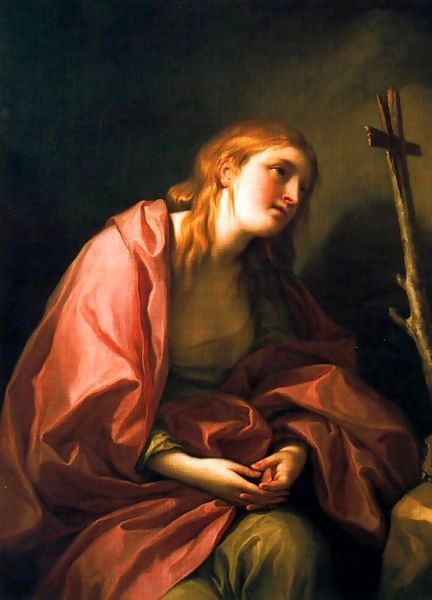
Prayers/Commemorations
First Vespers:
Ant. O Mary of exalted merit, who first of mortals merited to behold the true Sun in His rising, obtain that He may gladden us with thee by the sight of His glory in heaven.
V. Mary hath chosen the better part.
R. Which shall not be taken from her.
Lauds:
Ant. O lamp of the world and shining jewel, who by announcing the resurrection of Christ dist merit to be made an apostle to the Apostles, O Mary Magdalen, be for us ever a pious intercession at the throne of God, who hath chosen thee.
V. Many sins are forgiven her.
R. Because she hath loved much.
Second Vespers:
Ant. In those days a woman who was a sinner in the city, when she knew that Jesus was at table in the house of Simon the leper, took an alabaster box of precious ointment: and standing behind at the feet of the Lord Jesus with her tears she began to wash His feet and with the hair of her head to wipe them, and she kissed His feet , and anointed them with the ointment.
V. Mary hath chosen the better part.
R. Which shall not be taken away from her.
Prayer
Let us Pray: Grant, O most merciful Father, that as Blessed Mary Magdalen, through the love she bore Our Lord Jesus Christ above all things, gained the pardon of her sins, so likewise may she obtain by Thy tender eternal happiness for us. Through the same Christ our Lord. Amen.
Prayers to St. Mary Magdalene
We beseech Thee, O Lord, that we may be helped by the intercession of blessed Mary Magdalen, at whose prayers Thou didst raise up again to life her brother Lazarus, who had been dead for four days. Who livest, and reignest, for ever and ever. Amen.
O most loving Jesus, give me an earnest will to forsake all evil, and to return to Thee, my chief good, to repent of my sins out of true love, to guard against them for the future, to shun the occasion by which I have hitherto been enticed into sin, and by the practice of good works to redeem the time lost. Grant me this, O Jesus, by Thy bitter passion and death, and through the intercession of the holy penitent Magdalen. Amen.

